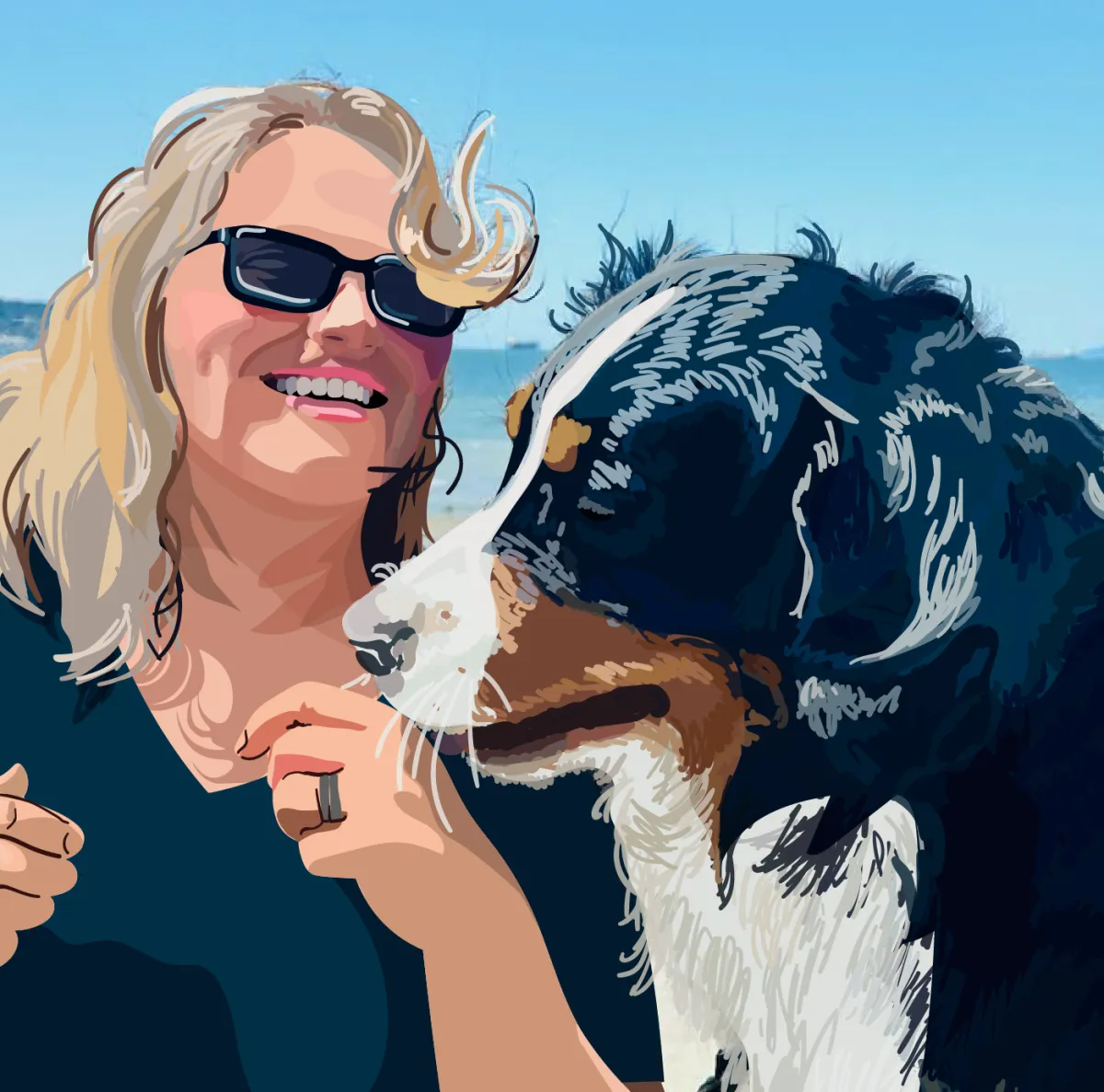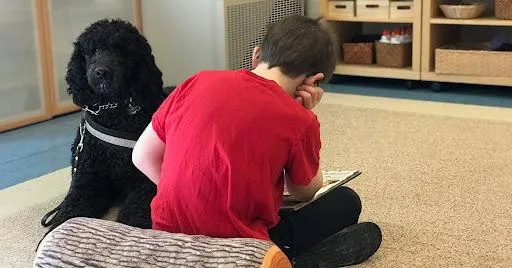

About Us
Since 2011, we’ve combined formal education in psychology, veterinary care, and canine cognition to provide exceptional training.
As an SPCA Accredited AnimalKind organization, we rely on the latest research, while ensuring that our work is rooted in 15,000 years of human-dog connection.
Dogs and humans have evolved together for 20,000 years. They have found food for us, and protected our families and livestock. They have gone to war with us and acted as gentle playmates for our children. They have laid down their lives to save us.
Our lifestyles have changed a lot in the last century, but our need for dogs hasn't. A dog and their owner, when reunited, sync their heart rates within minutes. Just owning a dog decreases heart attack mortality by 30%.
We are designed to live with dogs, but we need to learn how to incorporate them into our chaotic modern lives.
We're here to help your dog become a helpful and contributing member of your modern family.
Forget sit and stay!
At Wag The Dog we can teach dogs to:
Find our phones and keys when we lose them.
Find our children when we lose them!
Put recycling in the blue bin.
Fetch their own leash for walks.
Comfort us when we are sad or stressed.
Close doors and cupboards.
Imitate our actions.
Communicate their needs and thoughts clearly.
Recognize fragile people like children and the elderly and be cautious around them.
Assist us with our disabilities
Accompany us on outings to stores and markets.
Trust us to return home to them when we go out.
Understand simple phrases and two step instructions.

Carol Millman (she/her)
- Lower Mainland
B.Sc, Psychology, Veterinary Technologist, Certified Pet Dog Trainer - Knowledge Assessed, Certified Trick Dog Instructor
Carol lives in Port Coquitlam and works in the Lower Mainland. Her autism gives her a unique perspective which she brings to her work with both dogs and people. Her time working as a veterinary nurse culminated in becoming the Director of Medical Services at a holistic veterinary clinic.
In 2008, Carol was hired as an apprentice Advanced Instructor at Pacific Assistance Dogs Society (PADS). She trained and placed wheelchair assistance dogs, hearing dogs for the Deaf, and facility therapy dogs. She also ran puppy classes and assisted in the daily care of the dogs in training.
PADS still sends people Carol's way when they are looking for private service dog training.

- Currently On Leave -
Amelia Kellum (she/her) - Fraser Valley
B.Sc Canine Studies, Certified Professional Dog Trainer Knowledge/Skills Assessed, Certified Trick Dog Instructor.
Amelia is a certified professional dog trainer with nearly two decades of experience training dogs - including hunting, acting, and assistance dogs such as hearing, therapy, guide, and mobility dogs.
Amelia has learned directly from Bonnie Bergin, pioneer of the disability assistance dog, and is also a graduate of the Ben Kersen and the Wonderdogs professional trainer's program.
She apprenticed at PADS as an instructor and has been training independently since 2010. She now lives in Hope with her family.
What can you achieve
with our help?
Come check out our blog!

Don't Get An Autism Dog For Your Kid
Please Don't Get A Puppy For Your Autistic Child.
Autism dogs can be life-changers, but getting a puppy for your autistic child rarely works out well.
Autism dogs seem to be the newest accessory for autistic* children.
* I am formally diagnosed with autism myself, and I don't think it's insulting to use the adjective "autistic". In fact, I'm insulted by people who think it's insulting.
According to people on the internet, who as you know, are never wrong*, a magic dog can heal your autistic child.
* Sarcasm. People on the internet are often wrong.
For example, a woeful number of them will defend this puzzle piece ribbon, even though it is an abomination.
Either the person who designed it has never done a jigsaw puzzle in their life...
...or they committed this sin deliberately to torture the autistic mind's need for correctness and order.
...Seriously, the longer you look at it, the worse it gets.
We are contacted on a weekly basis by parents of autistic children to get training for their new puppy, often a woefully inappropriate breed, to become an "autism dog".
I put "autism dog" in quotes because usually I can't get any more details than that.
People know that autism dogs exist, but seem a little vague on what they actually do. All they know is that their kid needs one.
Here's What An Autism Dog Can Do:
Anchoring
Dogs can anchor a small child who is prone to taking off, stopping at curbs and coming to Mom when called, and thus bringing the child with them.
Behavior Interruption
Dogs can be taught to interrupt self-harmful behaviors like skin picking or head banging.
Social Support
Dogs make for great conversation greasers. As an autistic person, I can vouch for how easy social interactions are when you have a dog.
People always ask the same questions, and I've got the scripts for the answers down pat.
Then people start talking to me about their dog and I just nod and smile and coo over pictures. It's easy!
Sensory Support
Is there anything more soothing than the feeling of soft ears between my fingers? A firm handle to hold is steadying when I'm feeling lost and overwhelmed. A tug of a guiding dog with a handle can even help me overcome autistic inertia.
Unconditional Love
When you're autistic people tend to look at you strangely. A lot. We process the world differently, so we experience the world differently ...which means that, quite frankly, we inhabit a slightly different reality from the people around us.
That can get lonely.
You know who doesn't care whether I made a faux pas at a party? Dogs. Dogs are completely immune to cringe.
So, yeah. Autism Dogs can do a lot.
With all of that, it makes sense that parents - always trying to do the best for their child - are looking to make their Child With Autism into a Child-With-Autism-Dog.
Sometimes, working with an autistic child and their dog can be the highlight of my day.
Sometimes my phone lights up with texts from clients telling me that their child went to the DENTIST without a fight because they were told the dog could come too.
Personally, dogs are necessary for my sanity.
So, why did I start this article by telling parents NOT to get one?
Well, there are a lot of reasons, but let's start with the things autism dogs can't do.
What An Autism Dog Cannot Do
A dog can't fix autism.
A dog can't rewire our brains.
A dog can't make the world quieter, the lights in the grocery store dimmer, or help us when we panic at Subway because they forgot one of the sandwiches we ordered and now we have to either go home short a sandwich and go hungry for dinner......or speak up.*
*I went home without my sandwich.
They definitely can't help us when we try to navigate downtown without Siri and accidentally turn the wrong way on a one way street.*
*If any police are reading this, I'm joking!!!!
...No, seriously it was scary but no one got hurt and now I will always have Siri on. I'm too autistic for downtown and I've learned my lesson.
We WILL still be anxious, because the world is complex and not designed to fit our needs. A dog can't change that. All they can do is help keep us company.
When people bring a dog home to be their child's "autism dog", I frequently find that the dog - often just a puppy - cannot live up to the expectations of their owner.
Reasons Why You Should Not Bring A Dog Home
Reason 1: The Child Doesn't Love Dogs
If you're an autistic kid and dogs are your special interest, then a dog is the best present your parents could ever get you.
But the fact is that the majority of autistic children, from verbal to non verbal, from apraxic to non-apraxic, with or without intellectual disability, do not enjoy dogs..
Dogs are slimy. Dogs are smelly. Dogs want eye contact. Dogs poop and drool and chew and bark. They jump on you. They nip and claw at you.
Dogs are sensory NIGHTMARES.
Quite frankly I can't even explain why I like them, because I dislike basically everything I mentioned above.
If I didn't have this sweeping obsession with animals I'd probably hate dogs too.
Autistic people are often more cat people than dog people. Horses tend to be good. Rabbits. Guinea pigs. Doves, maybe. Not stinking, drooling, biting, noisy dogs.
Reason 2: The Parent Wants The Dog To Accompany The Child
Dogs need handlers.
Children under the age of 10 or so tend not to have the ability to handle a dog - even a well trained one - on their own.
...Although the child pictured here passed the certification test at the age of 8, so there can be exceptions. But even he once described having his dog with him as like parenting another child.
In cases where the child younger than twelve, intellectually disabled, or severely apraxic and unable to control their bodies and communication, the parent must be the handler.
So that means the parent now has to control both the dog and child.
This basically means that the parents' work load increases, if anything.
Especially since there will be a couple of years of training before the dog can even be useful.
During puppyhood and training it's a fully additional burden on a family that is often already under a lot of stress and pressure.
Reason 3: Autism and Puppies Do Not Mix.
Yes, even if your child loves dogs.
Yes, even if your child desperately wants a dog.
Puppies are terrible - especially if you're autistic.
They are untamed baby predators.
Their breath smells like skunk.
They leave smelly messes on the floor.
They chew beloved toys.
They jump up.
They have VERY sharp teeth which they like to embed in our skin.
They chase anything that moves.
Even if your child really wants a dog, puppyhood is... really hard.
Even if you think you know what to expect... you don't.
Reason 4: Your Child Can Get Violent
This little fellow had to be rehomed, through no fault of his owner's.
Mom did everything right.
But the dog was in physical danger from her child.
Violent behavior is pretty common during meltdowns.
While some of us just elope and scream, or collapse on the floor like a Victorian lady, some autistic people hit and throw things during meltdowns.
...and sometimes those things can be puppies.
Yes, we have witnessed this happening.
No, your child can't control it.
I'm a grown up woman, married, a parent, I run my own business, and I still can't control myself during a meltdown so we absolutely cannot expect that of a child.
Thankfully I'm not the violent type. I'm a victorian lady/eloper type. I haven't ever thrown a punch. But some do.
And if innocent people can end up in the crossfire, then so can a dog.
I have seen this happen in families where the parent was 100% positive that their child would never hurt a dog.
MULTIPLE families who were certain their child would never hurt a dog.
When a child is in meltdown they are not in control of themselves.
No matter how much benefit a dog could bring to your child, no matter how much your child professes to love dogs, if your child hurts people during meltdowns, they cannot have a service dog.
We do not have the right to put a dog in harm's way.
Reason 5: MOOOOOOO.
Autism is a cash cow.
While funding and support for autism dries up at age 18,* the government offers a whopping amount of financial support for autism compared to other neurodevelopmental disabilities like ADHD.
*And NO ONE seems to treat or even go near autism in adulthood. I have been turned away from Fraser Mental Health because their psychiatrists "don't deal with" autism, and also informed that they will not communicate with me in writing despite me needing it for reasons relating to my disability.
There are a lot of vultures out there looking to get money from parents just want to help their child as much as possible. Selling you an "Autism Dog" is a popular one.
Note:
I'm not referring to fully accredited charities such as BC Guide Dogs. A respectable and certified assistance dog school will put you through a rigorous vetting process to ensure that you meet their criteria. They will not be eager to hand you a dog, nor will they demand money beyond an application fee or encouraging you to help fundraise.
Their dogs will be well trained and carefully picked to suit your family's needs.
Unfortunately, since accredited charities contend with massive wait-lists, and since they triage their applicants, many families either don't qualify (likely for good reason - see all the above reasons) or do not want to wait years for a dog.
This opens them up to predatory service dog programs who will often charge thousands for poorly trained dogs who sometimes even bite the children they are supposed to be helping.
Yes, this happens. (TW: suicide, fraud) Quite often, actually.
It is not uncommon for less scrupulous dog trainers to bill themselves as BIs, so the family can use your tax dollars for autism funding to pay the trainer.
To be clear - this is fraud, and the government of BC sees it as fraud and we at Wag The Dog WILL NOT PARTICIPATE IN IT.
I'm too autistic to lie and defraud taxpayers, sorry!
Reason 6: It's A Lot To Ask Of A Dog Who Did Not Volunteer
As any parent of an autistic child knows, autism support work requires patience, fortitude, and a level of savoir faire that many dogs simply do not possess.
To support their person, the dog must be the strong one, the savvy one, the confidant one, and they have to WANT to do that job.
Anxiety in dogs is at an all-time high, and an anxious dog can't support someone else's anxiety.
Nor can any puppy - a child should not be leaned on emotionally by their older family members, even if they're a dog-child.
People seem to think that training a service dog is just a matter of adding a few additional commands to the traditional line up of sit, lie down, stay, and shake.
They often don't stop to think about the fact that if you pick a cute baby out of a line up, and decide that she's going to be a doctor when she grows up, you're likely to be disappointed in 20 years.
You can't decide someone's career for them when they're only 9 weeks old.
Our puppy prodigy program is designed to maximize a dog's potential, give the guardian good communication with their dog, and build an emotionally healthy foundation.
But we can't change their fundamental temperament.
A nervous, jumpy dog will always be a nervous, jumpy dog. All we can do is help them feel comfortable and safe in as many places as possible, so they won't be so nervous and jumpy. But support and coping skills don't change who the dog is.
A dog who hates to be manhandled will never love to be manhandled. We can help them learn to tolerate necessary touch for coat and nail care and maintenance, and sedate them for more invasive vet procedures, but they won't ever be "PLEASE PET ME!" type dogs.
So even if you have a dog-obsessed kid, you also have to find a kid-obsessed dog who just loves to keep them company in weird and scary doctors' offices, schools and shopping malls.
So, it's hopeless?
No, it's not!
While we've seen far more failed attempts than success stories, we DO see success stories.
For the autistic kids who have the right dog and the right attitude, a dog can be an absolute god-send.
All of our success stories managed to avoid the six pitfalls I listed above.
But for every success I could tell you about, I could tell you about five more families whose kid didn't want anything to do with the dog, who had to rehome the dog, who dropped out of training because it was too much work or whose dog turned out to have anxiety even though they did everything right.
So, if you think that you are that exception to the rule... by all means get in touch.

We work on land which was taken from the nations who had lived here for thousands of years. They are still here and they are still waiting patiently for us to stop being jerks about it.
© 2024 Copyright Wag The Dog Training
All Rights Reserved




